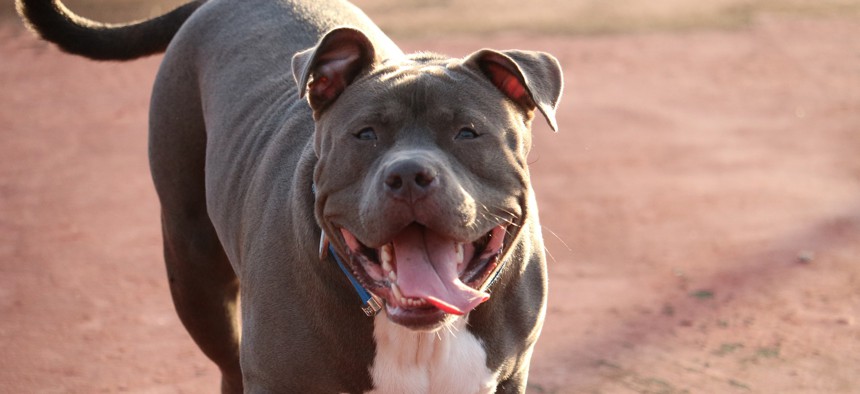Policy
Miami-Dade pit bull ban could be going to the pound
A bill filed in the Legislature this year would revoke the ban, prohibit dog height and weight restrictions.

Image by thewrightmoment2016 from Pixabay
Miami-Dade County’s three-decade-old pit bull ban could come to an end if legislation filed in the Florida Legislature passes this year.
The bills (SB 942, HB 941), sponsored by state Sen. Alexis Calatayud and state Rep. Demi Busatta Cabrera, both Miami-Dade Republicans, would remove the breed ban in that county, while also prohibiting municipalities from enacting dog height and weight restrictions and keeping public housing from enacting restrictions.
The bill’s sponsors point to findings from federal agencies that dog breeds are not a factor in whether a dog is aggressive or not. Additionally, they argue such restrictions increase the burden on local animal control agencies: A loss of housing is one of the most common reasons dogs are turned over to animal shelters.
The legislation, which is likely to pass, already has cleared two committees in the Senate and one in the House. But some critics have said the legislation further hamstrings local officials from making decisions about their community. State lawmakers have been on a roll in recent years in passing preemption measures, which bypass local autonomy in decision-making – a common issue in the current and past several legislative sessions.
As of Tuesday, requests for comment about the ban repeal were pending with the lawmakers and with Miami-Dade County officials.
1989 mauling led to pit bull ban
The county’s breed restrictions first came after an incident in 1989 in which a seven-year-old was attacked by a pit bull. Melissa Moreira was attacked by a neighbor's pit bull, and had her face and arms mauled, requiring facial reconstruction surgery. The dog then attacked her mother and grandmother before a neighbor shot and killed the animal. To this day, Moreira opposes allowing pit bulls as pets.
Following the attack, the Miami-Dade County Commission enacted a ban on all pit bulls and pit bull mixes. In the ensuing decades, thousands of pit bulls were captured and euthanized by the county. The local ordinance faced legal challenges in 2009 that slowed dogs being put down. County residents then voted by an almost 2-1 margin in 2012 to keep the ban. Meantime, Miami-Dade commissioners have tried but failed to overturn the ban.
In recent years, the Florida Legislature has begun to step away from using breeds as a determining factor in restrictions, but have left the Miami-Dade County ban in place. Legislation last year made it so that dogs would not be registered as dangerous based on breed, but on the behavior of the individual animal. It also banned municipalities from having breed restrictions, but grandfathered in Miami-Dade’s ban.
Studies show bans don’t work, sponsor says
Speaking on behalf of her bill before the Senate’s Agriculture Committee, Calatayud said studies have shown that breed restrictions are ineffective at preventing dog attacks. She cited studies from the Centers for Disease Control and Prevention and the National Canine Research Council that a breed is not a determining factor in the likelihood that a dog will bite someone. “Breed restrictions are antiquated attempts to reduce liability in a community,” Calatayud said. “Breed-specific legislation is not a tool for keeping communities safe.”
Calatayud elaborated on why the bill also prohibits Florida’s more than 100 U.S. Housing and Urban Development housing authorities from enacting breed, weight and height restrictions. Over 60% of them do, and of the 30,000 dogs surrendered each year to Florida animal shelters, the most cited reason is difficulty with housing.
“Arbitrary breed and size restrictions in public housing directly contribute to the financial strain animal shelters placed on our local governments. Removing arbitrary restrictions around dog breeds will neutralize a major barrier to stable housing for families that are most in need,” Calatayud said.
So far, the bills have had only one detractor in committee. State Sen. Geraldine Thompson, a Windermere Democrat, voted against the bill because she said she’s a proponent of home rule. “I don't think that we have all the answers here in Tallahassee. Knowing that Miami-Dade County has restrictions on pit bulls, I will defer to those elected individuals who are closest to the citizenry … and not preempt this decision here to the Florida Legislature,” she said.
Calatayud said she hasn’t received any pushback from her fellow delegation members and added that enforcement of the ban costs the City of Miami alone an estimated $603,000 per year. It’s simple, she said: “Counties cannot put arbitrary breed-based restrictions on dogs.”
Contact Tristan Wood at twood@cityandstatefl.com and follow him on Twitter: @TristanDWood.
NEXT STORY: Tallahassee officials host dueling press conferences about police drug policy
